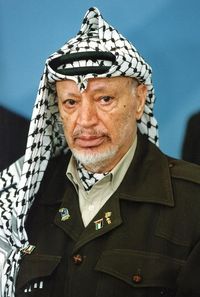Yasser Arafat, born Mohamed Abdel Raouf Arafat al-Quudwa al-Husseini, also known by his nickname Abou Ammar, was a Palestinian activist and statesman. He was born on August 24, 1929, in Cairo, Egypt, and passed away on November 11, 2004, in Clamart, Hauts-de-Seine, France.
As the leader of Fatah and the Palestine Liberation Organization, Arafat was a controversial figure in the expression of Palestinian national aspirations before becoming a partner in Israeli-Palestinian peace discussions in the 1990s. He represented the Palestinians in various peace negotiations and signed the Oslo Accords in 1993, becoming the first president of the Palestinian Authority and receiving the 1994 Nobel Peace Prize alongside Shimon Peres and Yitzhak Rabin.
However, after the failure of the Taba summit and the outbreak of the second intifada in 2001, Arafat's popularity began to decline, and he was criticized for the corruption within his authority. He became increasingly isolated on the international scene, and the Israelis elected Ariel Sharon as their Prime Minister, leading to a hardening of their position towards Arafat. He was eventually forced to remain in Ramallah, where he died at the age of 75 on November 11, 2004.
In 2012, Arafat's remains were exhumed to investigate the possibility of death by polonium 210 poisoning. A team of Swiss experts concluded that it was poisoning, but Russian and French teams concluded that it was death from old age due to gastroenteritis. The Institute of Radiophysics in Lausanne analyzed Arafat's remains and concluded that he died of polonium poisoning in 2004.

























